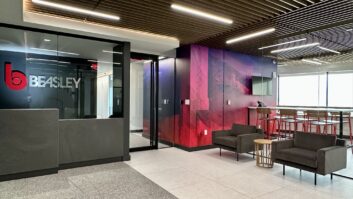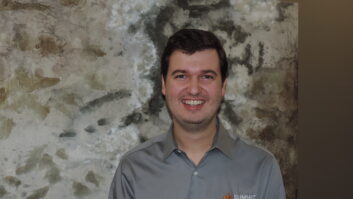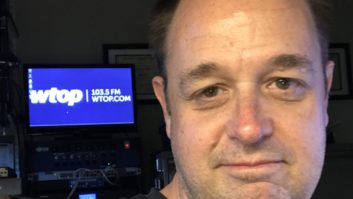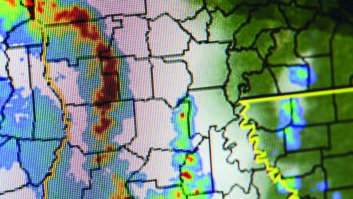The last few months have been a time of pessimism in radio and the economy at large. As a result this could be an NAB of low expectations.
The nation’s business situation is soft. Radio revenue dropped last year. Clear Channel isn’t sending top radio engineers to the show. CBS and Citadel have laid off employees in recent months. HD Radio transmitter sales seem to have plateaued. Apple and Avid pulled out of the show on the TV side.
“Old media” and old ways of “conventioneering” both can seem dated in this age of online marketing, social networking, personal audio devices and super-tight bottom lines.
What a shame to not take advantage of the exceptional educational opportunities offered by the convention.
More broadly, what a shame if radio, a $21 billion industry, can’t figure out how to thrive in this evolving environment.
The two goals are connected.
Losing ground
BEC organizers have again created what I consider the best educational track in this industry.
I could see the themes quite dramatically as I compiled the pre-show contents of this issue of RW, which focuses on the engineering conference.
Consider:
If you are responsible for radio technical facilities but you’re not getting hip to the language of IP, you’re losing ground.
If you have a horse in the HD Radio race and you aren’t informed about the implications of the possible FM power increase, you can’t plan wisely.
Some of the most important research in radio today — maybe even all of it, beyond that done by private manufacturers — is being done by NPR Labs. Have you met John Kean or heard him discuss his findings about digital radio coverage?
We report on all these topics in RW better than any competitor. And you might talk about them in listservs or at local SBE chapter meetings.
But you’ll only get part of the story that way. Nothing can replace several hours in a room with an expert delving into the deep nitty-gritty, then talking to the guy sitting next to you about his own experiences in the field.
Beyond the engineering track, consider that your future as an industry technology professional will depend in part on your understanding of the new media that compete with radio and are part of radio’s developing master toolkit.
Do you manage a technical strategy to consider multiple platforms like HD2 streams, text, RDS, alerting? Who doesn’t these days? But are you current on them? More important, is your company making decisions about new platforms and not including you in the discussion? Are you pushing to be part of that and educated in that?
(I do wish the Radio Management Conference, which we’ll preview next time, could be half as useful and informative as the BEC. That agenda is again this year thinner and less detailed in advance of the show, and less inspiring to think about.)
Direct impact
It���s clear to anyone paying attention that the next few months and years will see a growing investment by traditional radio owners in new ways of reaching consumers.
What could demonstrate this more dramatically than the way CBS Radio, that old foot-dragger online, has reinvented its new media strategy in the past couple of years. Now it is powering AOL Radio and driving ad sales for those “stations.” Do you understand why this affects you?
In fact the very meaning of the phrase “working in radio” is evolving. Managers (technical and otherwise) must learn what it means to promote through podcasting (and even why that term is already dated), to develop online video, to encode for the new age of “secondary” data services that now are growing in importance.
Our industry brought in $1.7 billion in off-air revenue last year, up significantly from the year before. Your company might not pay the way, so have you invested a few hundred dollars to teach yourself more about the tools being used to gather this new revenue?
Make no mistake. I find the convention process wearying.
I have worked most spring and fall NAB events — as an exhibitor, and then as a journalist — for two decades now. Seeing old friends is a big recompense for the pain, but I have to push myself to find energy for the long flights, the longer days, the sore feet, the cynical aisle prognosticators and the endless, repetitive booth conversations (not to mention dealing with disgruntled suppliers who are just absolutely sure their product deserved a “Cool Stuff” Award).
But I suck it up every year. You should too, if you have any say in it or can find the dough.
In both our technology and our revenue base, the radio industry is going through an important time of transition. Seems to me it’s unwise not to be there, listening in on sessions and talking to other people in the aisles and booths, to be part of the discussion.
* * *
I asked Marvin Collins recently for an update on his health; he wrote in our opinion section last fall about his prostate cancer.
“I am delighted to report that a November blood test showed my PSA to be 0.1, which could not be better. It appears so far that the TomoTherapy at City of Hope National Medical Center has worked.”
Less than a year earlier, as he told us earlier, his PSA test had been 4.55, up from 3.29 the year before, and a subsequent biopsy showed early-stage prostate cancer. Marv opted for a new non-invasive treatment called TomoTherapy.
After getting the good news from the doctor in November, he decided to take a walk around the beautiful gardens of the California hospital.
“I had never done this during the hot weather of summer while I was undergoing daily radiation therapy. Nov. 26 was a cool clear day. The nearby mountains were beautiful, as were the City of Hope gardens. I enjoyed walking for an hour. It was a great day.”
Marv also commented on a follow-up letter by Jerry Puffer in our Dec. 5 issue.
“His letter is pro-surgery. I considered surgery; but I am aware people can die or get infections. The incidence of incontinence is higher with surgery. I have a long-time friend who had prostate cancer 12 years ago. He elected to have radiation therapy and 12 years later his PSA is running at 0.2, and he has remained cancer-free.
“These are factors that pointed me in the direction of non-invasive radiation therapy,” Marv continued. “When my information search uncovered TomoTherapy with its precise photon radiation aiming, I knew my search was over. When Dr. Jeffrey Wong at City of Hope confirmed my opinion, I said, ‘Let’s do it,’ and so far I am delighted with the result.”
How you might proceed in a similar situation is a matter for you and your doctor. But Marv and I repeat the advice from his earlier article: If you are an adult male, talk to your physician about whether and when you should have an annual PSA blood test.












